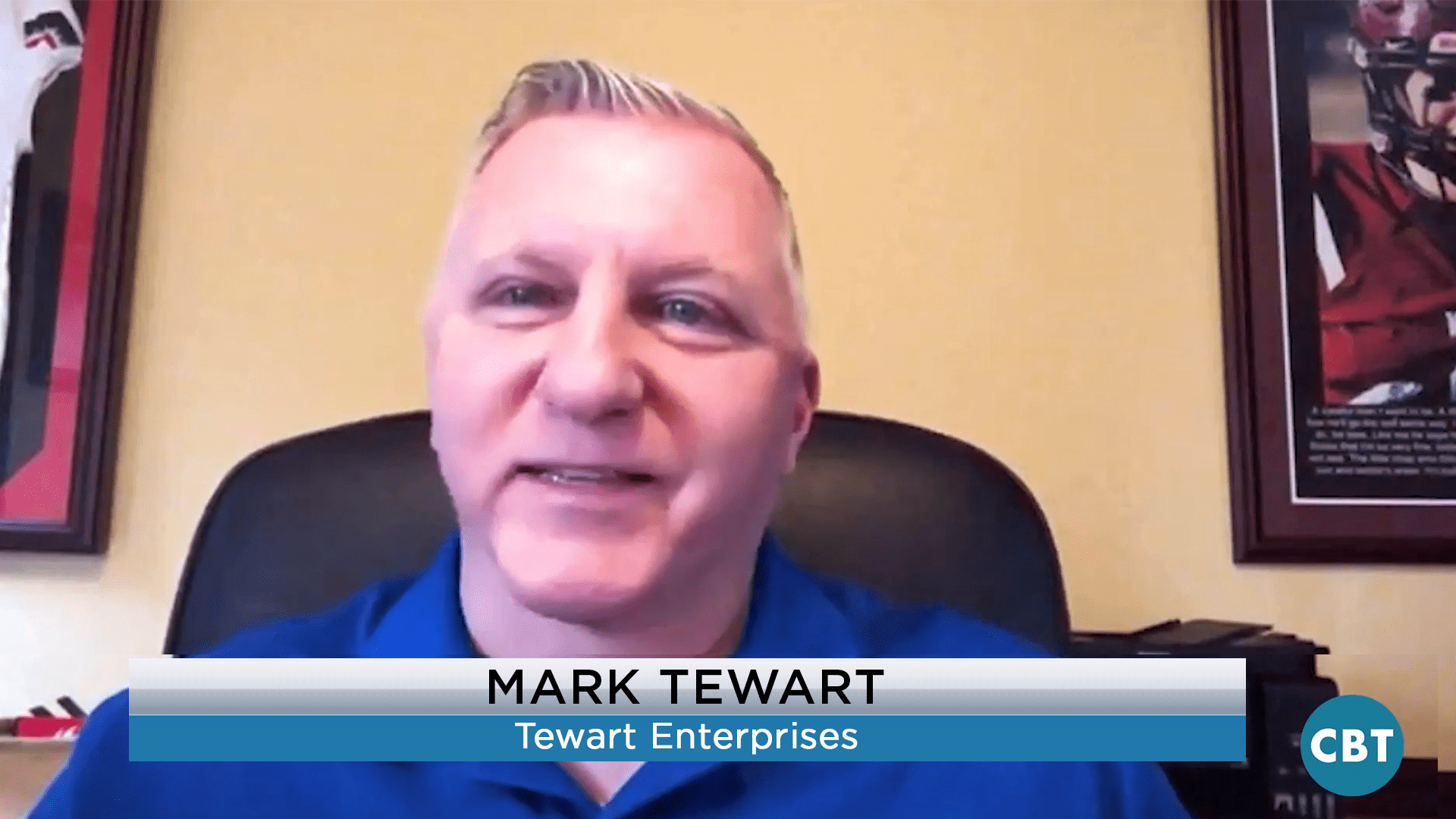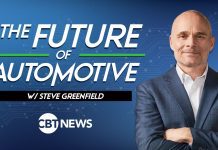On today’s show, we welcome back Mark Tewart, president of Tewart Enterprises, best-selling author of “How to Be a Sales Superstar,” and host of “On The Mark,” right here on the CBT Automotive Network. Welcome back to the show, Mark.
Jim Fitzpatrick: Hey everyone. Jim Fitzpatrick. Thanks so much for joining us on another edition of CBT News. On today’s show, we welcome back Mark Tewart, president of Tewart Enterprises, best-selling author of “How to Be a Sales Superstar,” and host of “On The Mark,” right here on the CBT Automotive Network. Welcome back to the show, Mark.
Mark Tewart: Thanks for having me. I appreciate it so much. Thank you.
Jim Fitzpatrick: Sure. So, you know, your show just continues to kill it on our network. We get so many great responses and comments from our viewers and subscribers, so thank you for that. I know that you just finished your talk out at Digital Dealer in Orlando. Talk to us about what that was about, and what you’re telling dealers today.
Mark Tewart: The topic of it was what I call “modernizing your sales process.” And oddly enough, it’s a combination of two very different things. One is how to integrate technology into your sales process, but the other part, very differently, is not to allow technology to be your “magic button,” if you will. And to utilize better the technology that we already have, rather than to just go look for more and more and more technology. The operation of the technology, and integration of people into the technology seems to be where we’re missing it. And the other part of it, too, was to talk about what I call an “omni-channel selling process.”
Mark Tewart: Each customer comes into a different channel to us today, where you may have one that’s sent an email lead through a third-party lead provider, organically through your website, through picking up the phone, they could walk in, they could come as a referral, they could come through texts. They could all be in different stages. So we talked about how to address each and every customer in the way that they want to be addressed, based upon the stage that they’re in. And I liken it to saying, “Okay, if you have a customer that’s shopping,” … And the analogy I give, let’s just say that this customer’s in Georgia, trying to get to Florida. And you have somebody else is in New York, trying to get to Florida, one in Ohio, and California, and they’re all trying to get to Florida, they’re all starting in a different stage.
Mark Tewart: So it’s really important to ask and recognize a customer’s stage that they’re already in, based upon the amount of homework that they’ve done. And then, go from there, and not treat everybody the same. And that’s what I see a lot is happening today, that we have to eliminate. We have to create well-thought-out, written omni-channel sales processes for every potential customer.
Jim Fitzpatrick: Yeah. That’s very good advice. And I think it’s also good advice for the desk manager. Because the salesperson might build that relationship, and figure out, “Okay, this customer really has done their shopping. They really are ready to buy a car in the next two or three days. They’re looking for the most that they can get for their trade-in, they’ve shopped that around, they’ve done some online research, they know pretty much what the car should sell for on a sale basis.” And then they get into the office, and with the manager at the desk, and he pencils the deal like he never heard any of that. And he starts at MSRP, with a $500 discount for today only, two grand under ACV on the trade, or estimated ACV, and he goes, “Now, go out and dish up these numbers.” Huge disconnect, right?
Mark Tewart: I think a lot of times, a manager is not involved from the very beginning. What’s happening is, they’re asking that salesperson to do something they wouldn’t do. So I’m a huge advocate with all of our clients, of doing the early intervention introduction. Think about it: we do a management TO, a turnover at the end, usually, when we think that the deal is lost, or gone south, or having problems, or not coming to fruition. Why not, why not introduce yourself from the very beginning, tell that customer who you are, and that you’re going to be working with them throughout this whole process. That makes customers feel better.
Mark Tewart: You know, I shared with somebody, I just did a talk in Calgary, and one of the most effective things that I ever did as a general manager, really took not a whole lot of intelligence, or anything else. But I remember on a Saturday meeting, telling the whole staff that on that Saturday, I was going to stand in the middle of the showroom floor, and I was going to go on a mission to shake hands and say “hi” to every person that walked in that dealership that day. And I may not get to them all, but I was really going to try to impact them physically, by saying “hi,” welcoming them, and let them know that I was there.
Mark Tewart: And I know what a big difference that made. I think it let the salespeople know that I had their back, that I was a head-up leader, not a head-down manager, and that I was willing to interact with the customer. And I know that the customers really appreciated it. So going a little old school with your new school technology in that regard, people’s skills are not old school. They’re new school. Get those involved with whatever you did.
Jim Fitzpatrick: What do you say to the dealer that says, “I don’t want my managers meeting the customer that early on, because they get too emotionally tied to the customer. They get too friendly with them early on, and then when the customer says, ‘Hey, Joe, you’re the manager. What’s the best deal you can make me on the car?'” There’s not that buffer that sometimes managers enjoy, that being the salesperson, to say, “Hey, go tell them this.” “Go say this.” “Make sure you get this from him.” “When he says this, come on back, and I’ll give you an additional discount, and we’ll work the deal accordingly.”
Jim Fitzpatrick: If, in the event, a customer, right up front, needs a manager, a manager might be more prone to give up the house much earlier on, because now they know that individual, and they can’t really escape that eye contact that they’ve got with the customer, the customer’s got with them. They say, “You just told me you’re the manager. You’re the one that write the deals, so what’s the best price on that new Chevy right there? Because that’s what I’m in to talk to you about.” And then the manager’s like, “Whoa. I’m kind of caught off guard, here. What do I do?”
Mark Tewart: That’s a great question. And originally, one of the reasons the desking system in itself was created, was to remove the emotions-
Jim Fitzpatrick: Right. Divide those two.
Mark Tewart: … and have a person as a buffer. So you could try to work a deal tactfully, and create gross profit. But I have to share with you, it’s just my opinion, and I understand why somebody would still feel that way. How much markup is really in a new car today? And how much markup, overall, in spread and margin, is there in vehicles, and will there be a dramatic difference? Instead of thinking that way, I would invite you to TLC: think like a customer. Stop thinking like a salesperson, stop thinking about whether it’s manipulation or the way that we can create a barrier, and break down barriers, and go back to the TLC. And then also, I would invite you to think of the word “sell,” means to serve. That’s the Greek root meaning of the word “sell.” So let’s just serve people. And you know what I found when we serve people? Give your managers credit that they can have gross profit, that salespeople can have gross profit, and make the numbers, and also please somebody. And you used the term “giving up the house.” I think we’re all good enough at our jobs that if we’d look at how we’re justifying our value in what we do, and we know what our specific, defining proposition is.
Mark Tewart: In other words, what makes us different? What makes us better? What makes us unique? What makes us have the best solution for that client? They can get a car anywhere. They can find that car online anywhere. They can get a dealership anywhere, but they can’t get you. So make it transformational, not transactional. Gross profit will not be a problem. That’s where we’re missing it today. We’re all trying to drive everything to be online to be transactional. Anybody can do that. We can all get the technology to do that.
Mark Tewart: The difference will be, the “My pleasure.” It will be the, “Fantastic.” It will be the way that you deliver that experience in the transformational. That’s where I believe we’re truly missing it. We’re looking for technology to deliver something that right now, even with artificial intelligence, it cannot. So, let’s not look at it as scarcity-based, that we’re going to give up the house. Let’s just go to, “How can we please more people? How can we solve their want or need problem? How can we help them get what they want, when they want it, how they want it, the way they want it?” And we’re going to find out that we’re going to sell more cars for all the gross profit that we’re ever going to want.
Jim Fitzpatrick: Let’s switch gears a little bit. You’ve got an upcoming Leadership & Management Workshop here. Talk to us about that, and the dates and times, and location. And also, what an attendee will walk away with.
Mark Tewart: Absolutely. And it’s going to be May 20th and 21st. It’s in downtown Cincinnati at a really cool venue that overlooks the Cincinnati Reds baseball park, in the entertainment district called The Banks. And for two days, it’s a very unique experience. This is for leaders, managers, or potential leaders, which could be anybody. But the majority of our audience is going to be anywhere from, we’re going to have dealer principals, GMs, GSMs, department heads of new car managers, we’re going to have parts/service. There’s not a position that you won’t have. We’re going to have BDC Internet department leaders. What will they get? We’re going to talk about how they can impact their position, their dealership, with not only leadership, but management processes.
Mark Tewart: And it’s very in-depth sessions. We don’t do keynotes. Besides myself, there will be four or five presenters, and the average presentation is going to be for two hours of very deep dives on each topic. From Internet with BDC, to digital marketing approaches, to what do you do with your leadership. We’re going to have experts that are subject experts there. Also, pre-owned vehicles, what do you do in today’s marketplace. If the marketplace turns down, we know how important pre-owned will be. So it doesn’t matter what your position is at a dealership, this will apply to you. And you can get all the information, and if you’d like to attend, you can get all the information one of two ways: you can go to tewart.com/register-
Jim Fitzpatrick: We’ll show it on the screen, here.
Mark Tewart: … or call us at 888-2-TEWART.
Jim Fitzpatrick: Okay. We’ll show it all on the screen, for those of you that are interested in attending. And if you can get out to the workshop, we highly recommend it here at CBT News. It’s a phenomenal workshop. It’s something that every manager, and dealers, should attend. I don’t care how long you’ve been in the industry, whether it be one day, or 20 years. It’s these types of programs and workshops, and especially delivered by Mark Tewart, are just invaluable. They really are. And it’s always good to get a brush-up on your skills if you’ve been in the business for a while. If you haven’t been, as I said, it’s great to get that foundational type training to go back to your dealership and knock the cover off the wall.
Jim Fitzpatrick: So Mark Tewart, I want to thank you so much for joining us on today’s show. We appreciate it. And hopefully, we can have you back here shortly to talk about some more of these topics and issues facing today’s dealer.
Mark Tewart: Thank you so much, Jim. I appreciate it, and I look forward to seeing everybody soon.








